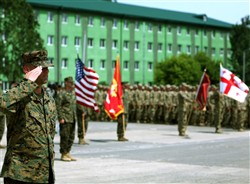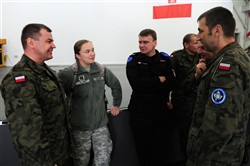Thracian Fall exercise kicks off in Bulgaria
C-130J aircraft from the 37th Airlift Squadron, Ramstein Air Base, Germany, fly over Plovdiv, Bulgaria, during Exercise Thracian Fall 2011, Oct. 17, 2011. Thracian Fall is an off-station training exercise designed to enhance interoperability between U.S. and Bulgarian Air Forces as well as build partnerships with paratroopers from both.
1st Lt. Caitlin Curran, a 37th Airlift Squadron pilot from Ramstein Air Base, Germany, reviews operating instructions during Exercise Thracian Fall 2011 in Plovdiv, Bulgaria, Oct. 17, 2011. Thracian Fall is an off-station training exercise designed to enhance interoperability between U.S. and Bulgarian Air Forces as well as build partnerships with paratroopers from both.
Related Topics (7)
More related topics
PLOVDIV, Bulgaria -- Service members from the Air Force, Army, Navy and Bulgarian air force are participating in a two-week jump exercise, which started Oct. 9 and is scheduled to end Oct. 22.
Operation Thracian Fall 2011 is part of a semi-annual off-station training that gives U.S. and coalition jumpers and pilots an opportunity to hone their battlefield skills together.
"We are here to further the U.S., Bulgaria ties, through cooperative training with Bulgarian forces," said Capt. Beau Tresemer, mission commander for Thracian Fall 2011. "It's a great opportunity to see how other countries train and prepare to fight."
C-130J Super Hercules from Ramstein Air Base, Germany, along with Bulgarian C-27 Spartans will continue to drop more than 100 coalition service members near a designated drop zone the rest of this week.
A plus to the training is the added benefit of working alongside Bulgarian service members, giving them a broad spectrum look at how the Air Force prepares for contingencies.
"Our pilots are accomplishing day and night flying with simulated combat drops in unfamiliar mountainous terrain," said Tresemer. "At the same time we are helping Bulgarians get their personnel airdrop qualifications."
"The Bulgarian airspace allows us the training we can't get in Germany," he said. "There are less restrictions on altitudes. Here we are allowed to fly as low as what our regulations say we can."
However, training isn't the only thing getting accomplished in Bulgaria. The relationship built from the jumpmasters from the U.S. and jumpers from Bulgaria is a bond that solidifies with each jump.
"It gets easier when we have a solid foundation of jumping with them in the past," said Staff Sgt. Myron Austin, 435th Contingency Response Group airborne planner and jumpmaster for the operation. "This is my third trip to Bulgaria and I have made plenty of friends that know me by face; the trust is there."
Find more articles tagged with:
- U.S. Air Forces in Europe
- C-130 Hercules
- USAFE
- NAVEUR
- U.S. Naval Forces Europe
- USAREUR
- Airborne
- training
- paratrooper
- Bulgaria
- Operation Thracian Fall
- U.S. Army in Europe
-

81st FS plays critical role in NATO exercise
The 81st Fighter Squadron is participating in a Ramstein ROVER 2012 Sept. 5-22.Find more articles tagged with:
-

ILA 2012 features US military aircraft
More than 300 aircraft from about 50 different nations are on display this week at the Berlin Air Show, commonly know as ILA 2012.Find more articles tagged with:
-

German exchange pilot brings C-17 for the Berlin 2012 Air Show
As the Charleston based C-17 Globemaster III landed in Germany for the 2012 Berlin Air Show, one aircrew member brought with him a different set of experiences.Find more articles tagged with:
-

Multinational Medical Soldiers Strive for Elite Badge
Nerves and excitement ripple through the air here this week as multinational medical Soldiers from across Europe prepare to pass the tests for the prestigious Expert Field Medical Badge.Find more articles tagged with:
-

USS Mount Whitney Remembers 9/11
The crew of USS Mount Whitney (LCC 20) and embarked U.S. 6th fleet staff gathered for a remembrance ceremony to honor those whose lives were lost during the terrorist attacks, Sept. 11.Find more articles tagged with:
-

CNE-CNA Fleet Master Chief Meets Ukraine’s First MCPON, Tours Naval Facilities
The fleet master chief (FLTCM) of U.S. Naval Forces Europe-Africa spent two days touring facilities and meeting junior and senior Ukrainian Sailors along with the recently selected first Ukrainian master chief petty officer of the navy (MCPON) in Sevastopol, Ukraine, Sep. 11.Find more articles tagged with:
-

Soldiers honored for rescuing German counterparts
A U.S. Army UH-60 Black Hawk pilot and a flight medic received an award during the opening day of the Berlin Air Show, Sept. 11, for their heroic efforts that saved 12 German army soldiers.Find more articles tagged with:
-

USS Farragut Makes French Connection
The guided-missile destroyer USS Farragut (DDG 99) departed La Rochelle, France, following a four-day visit, Sept. 10.Find more articles tagged with:
-

AES Airmen test capabilities on new airframe
Airmen from the 86th Aeromedical Evacuation Squadron tested their aeromedical evacuation capabilities on a new airframe here Sept. 3.Find more articles tagged with:
-

USS Farragut Departs Germany, Arrives in France
The guided-missile destroyer USS Farragut (DDG 99) arrived in La Rochelle, France, for a port visit, Sept. 7.Find more articles tagged with:



















Comments: 0